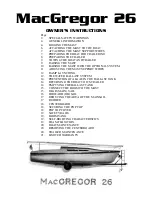
42
42
Helm Control Systems
• Trolling feature that allows the operator
to increase the engine speed in 50 RPM
increments while operating at trolling speeds
between 600 - 1000 RPM.
• Station transfer that allows the operator to
transfer control from one station to another
with the push of a button on boats with two
helm stations. Each station must be selected
before the controls will operate from that
station.
These features and others not mentioned require
specific procedures to activate and operate them
properly. Some of the procedures and features
are unique to the engines and other options
installed on your boat. It is essential that you
read the owner’s manual for the controls and be
completely familiar with their operation before
using your boat.
CAUTION
ALWAYS RETURN THE ENGINE THROTTLE LEVER TO THE
EXTREME LOW SPEED POSITION BEFORE SHIFTING.
NEVER SHIFT THE UNIT WHILE ENGINE SPEED IS ABOVE
IDLE RPM.
Engine Synchronizer
During most operations of a twin engine boat, it is
advantageous for both engines to be operated at
the same RPM. This reduces noise and vibration
and can increase engine efficiency. Setting the
throttles so that the engines are running the same
RPM (synchronized) can be done by listening to
the engine sounds at low RPM and with the auto-
matic synchronizer feature built into the electronic
engine controls when the engines are operating
above 1000 RPM. Attempting to synchronize the
engines solely by using the tachometer readings
or control lever placement generally will not work.
When the engines are in proper synchronization,
the throttle levers may not necessarily be even.
Refer to the engine or control owner’s manuals for
more information on the engine synchronizer and
other features for the electronic controls installed
on your boat.
4.3 Neutral Safety Switch
Every control system has a neutral safety switch
incorporated into it. This device prohibits an en-
gine from being started while the shift lever is in
any position other than the neutral position. If the
engine will not start, slight movement of the shift
lever may be necessary to locate the neutral posi-
tion and disengage the safety cutout switch. Control
adjustments may be required to correct this condi-
tion should it persist. See your Crevalle dealer for
necessary control adjustments.
The neutral safety switches should be tested peri-
odically to ensure that they are operating properly.
To test the neutral safety switches, make sure the
engines are tilted down and move the shift levers
to the forward position.
Make sure the throttle control levers are not
advanced past the idle position.
Press the start
button or turn the key just long enough to briefly
engage the starter for the engine.
Yamaha Control Tilt & Trim Switches
Summary of Contents for 33 CSF
Page 1: ...Crevalle 33 CSF Owner s Manual...
Page 2: ...2...
Page 10: ...10 NOTES...
Page 14: ...14 NOTES...
Page 23: ...23 Operation...
Page 74: ...74 NOTES...
Page 78: ...78 NOTES...
Page 84: ...84 NOTES...
Page 116: ...116 NOTES...
Page 124: ...124 NOTES...
Page 130: ...130 NOTES...
Page 146: ...146 NOTES...
Page 167: ...167 MAINTENANCE LOG Appendix C Date Hours Dealer Service Repairs...
Page 168: ...168 Maintenance Log Date Hours Dealer Service Repairs...
Page 169: ...169 Appendix D BOATING ACCIDENT REPORT...
Page 170: ...170 Boating Accident Report...
Page 171: ...171 Boating Accident Report...
Page 172: ...172 NOTES...
Page 174: ...174 NOTES...
Page 180: ...180 NOTES...
Page 186: ...186...
Page 187: ...187 CAUSE AND SOLUTI...
















































